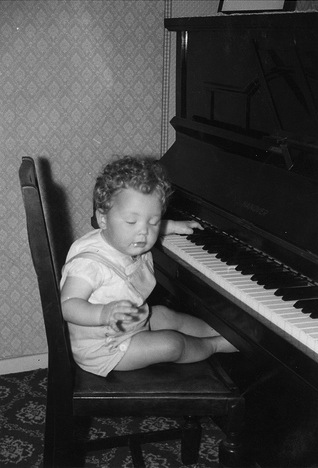Practical Music

This is a playlist of music I have written, and my arrangements of some of my favourite music.
- Gardens in the Rain (arrangement)
- My arrangement of Debussy's piano classic, for percussion ensemble and harp. I'm not sure if it is at all playable by any real percussionists: my sole intention was to produce a high quality audio file for listening to.
- Get Another Round In (original)
- One of my own, in a Jazz style. Give it a moment to get started. If you it like you can read about how it was written here.
- Berceuse (original)
-
A Berceuse (pronounced
bershoose
) is a cradle song, characterised by a gently rocking accompaniment, usually for piano, and usually in a very flat key. The most memorable example is by Fauré, from his Dolly Suite, which was used in the filmBicentennial Man
. Another famous berceuse is by Ilynsky. This is my attempt. The harmony revolves around an alternating major tonic minor dominant (mixolydian) figure, and the main theme bears a more than passing resemblance to the songOn Broadway
. Although common wisdom dictates that a berceuse shouldn't be too chromatic or modulate too much, the central section of this piece is little more than a study in sustained continuous modulation. - Sinfonietta (original)
- A short light piece in a very classical style, for chamber orchestra (solo instruments.) I'm quite proud of the third theme that placates the "angry" piano outbursts.
- The Maid of the Mill (arrangement)
- My arrangement of a folk tune, for recorder and harp. The tune itself was originally a rather lame melody from a long forgotten opera, but the simple alteration into the mixolydian mode (minor seventh) transforms the tune into something quite beautiful (the folk version of the tune is in the mixolydian, I didn't do anything other than write the harp accompaniment.)
- Chamber Music (original)
- Something between a suite and a rondo, in a slightly more modern style than the Sinfonietta. The canon near the start dominates rather too much, but it at least draws the listener in.
- Minuet and Trio (original)
-
This is the first piece I wrote since starting to study harmony properly. I realise it may sound
quite trite, but for me it represents a step forward because it has proper musical form, and it uses
a trick called
tonicization
that I had only recently discovered.
The Minuet is in F, and the trio in the relative minor. There is astory arc
that moves from happy/contented in the minuet through angry then sad in the trio, and the return of the up-beat mood in the minuet (D.C. al Fine without the repeats) rounds the peice off well in my opinion. It's also quite playable, even by me! - Searching for Lambs (arrangement)
- This is one of the most beutiful of english folk tunes. The meter may seem a bit odd: three bars of 5/4 followed by a bar of 3/4. This is common in folk music where there is a disinclination to hold a note for too long, and it makes perfect sense here. The melody is strong enough to be heard unaccompanied both at the beginning after which the harmony is introduced gradually, and at the end where the listener has heard enough to appreciate the strength of the tune and can imagine their own harmony.
- Variations on a Ground (original)
-
The
ground
in question is a very old melody calledL'Homme Armé
(The Armed Man.) This set of variations for recorder quartet repeats that same melody in the bass each time, while the harmony, and even the key, is changed above it. - Extended Rhythms (original)
- Another very short peice of mine for percussion ensemble, using both rhythmic phasing and polyrhythms in 12/8 (12/8 is great for this kind of thing).
- Sally in our Alley (arrangement)
- A folk song arrangement for string Quartet. Britten did it better but it's a nice tune at least.
- Me, Me and None but Me (arrangement)
- A beautiful tune by arguably our greatest English songwriter, John Dowland. This is my arrangement of it, for small chamber orchestra.
- Dance (original)
-
A short, quite fast piece for piano using the same metre as
Searching for Lambs
and incorporating that tune at the end. - Study (original)
- Another short piece for piano, arpeggiating a chord sequence.